咨询公司面试案例分析指南咨询面试系列如何应付案例分析面试
六个策略帮助你应对面试中的案例分析问题

六个策略帮助你应对面试中的案例分析问题面试是求职过程中的一项重要环节,而案例分析问题常常是面试中的重点。
面试官通过案例分析问题,评估面试者的思维能力、问题解决能力和沟通能力。
在应对面试中的案例分析问题时,以下六个策略能够帮助你取得更好的效果。
策略一:理解问题在回答案例分析问题之前,首先要确保自己充分理解问题。
仔细阅读问题陈述,明确问题所涉及的关键信息和背景,确保自己对问题的理解准确无误。
如果有不清楚的地方,可以主动向面试官提问,以便更好地理解问题。
策略二:分析问题在理解问题的基础上,进行问题分析是非常重要的。
将问题拆解为更小的子问题,找出问题中的关键要素和关系,进行逻辑推理和分析。
通过对问题进行深入思考和分析,可以帮助我们更好地理清思路,并找到解决问题的有效途径。
策略三:建立框架在面对复杂的案例分析问题时,建立一个框架会帮助我们更有条理地解答问题。
框架是问题解决过程中的一个结构,可以帮助我们整理思路、提供清晰的逻辑结构,并使回答更加系统化和有条不紊。
在建立框架时,可以根据问题的特点,选择合适的框架模型,如SWOT分析、五力模型等。
策略四:寻找关键信息在回答案例分析问题时,面试官通常会提供大量的信息,而其中只有一部分是关键信息。
我们需要从众多信息中筛选出关键信息,避免陷入信息过载。
关键信息通常是问题解决的核心,通过识别和利用关键信息,可以更快地找到问题的解决方案。
策略五:提出假设和解决方案案例分析问题往往没有唯一的正确答案,我们需要根据问题的要求和限制条件,提出合理的假设和解决方案。
在提出假设和解决方案时,需要考虑问题的多个方面,权衡利弊,做出合理的判断。
同时,要清晰地陈述自己的假设和解决思路,并给出相应的理由和支持数据。
策略六:沟通与展示在回答案例分析问题时,清晰的沟通和良好的表达能力尤为重要。
面试官更加关注我们的思考过程和沟通能力,而不仅仅是最终的答案。
因此,在回答问题时,要始终保持清晰的思路,用简洁明了的语言表达自己的观点,注重逻辑的连贯性和语言的准确性。
如何应付案例分析面试

如何应付案例分析面试在准备工作面试时,案例分析面试是一个很常见的形式。
这种面试考察的是求职者的逻辑思维能力、解决问题的能力和沟通能力。
下面我将分享一些关于如何应对案例分析面试的技巧。
1. 了解公司和行业背景在开始准备案例分析面试前,需要先了解来自被面试公司及其所在行业背景。
做这项准备的目的是让自己对公司和行业有一个大致的了解,这样可以帮助你更好地理解问题和场景,并更好地进行决策和发表意见。
在做这项准备时,了解公司的品牌地位、市场份额、目标客户和历史背景是非常重要的。
2. 熟悉案例分析的基本步骤在你进行案例分析面试之前,需要先了解案例分析这项工具的基本步骤。
这些步骤包括:问题定义、信息收集、分析问题、提出解决方案,并回答一些常见的关于解决方案的问题。
熟悉这些步骤可以让你更有条理地回答问题,并帮助你更快地解决问题。
3. 建立自信和沟通能力在案例分析面试中不仅需要解决问题,还需要与面试官进行有效的沟通。
因此,你需要建立自己的自信和沟通能力。
对于沟通能力的培养,一种方法是多与他人进行交流和讨论的实践,这可以帮助你更好地掌握自己的观点并形成思考方式。
关于建立自信,则需要通过掌握知识和强化练习来培养自己的自信感,并明确自己的目标。
4. 练习模拟面试在准备案例分析面试时,模拟面试是一项非常重要的练习方式,可以帮助你更好地了解面试的流程和注意事项。
在模拟面试中,你可以让他人扮演面试官的角色,提出不同的问题和场景,或你也可以在网络上寻找一些在案例分析面试方面的模拟面试练习题。
5. 做好心理准备最后,在应对案例分析面试前,需要做好进行心理准备并保持冷静。
你需要意识到这是一个考验而且你不一定会知道如何做出完美的决策。
做好心理准备,不要过于紧张,才能更好地发挥自己的潜力。
在总体上,案例分析面试是一个非常重要的环节,建议求职者们在开始面试之前进行充分的准备。
建立自信和沟通能力、熟悉案例分析基本步骤、做好心理准备和练习模拟面试,这些技巧都能够帮助求职者更好地应对案例分析面试。
资格如何应对案例分析题
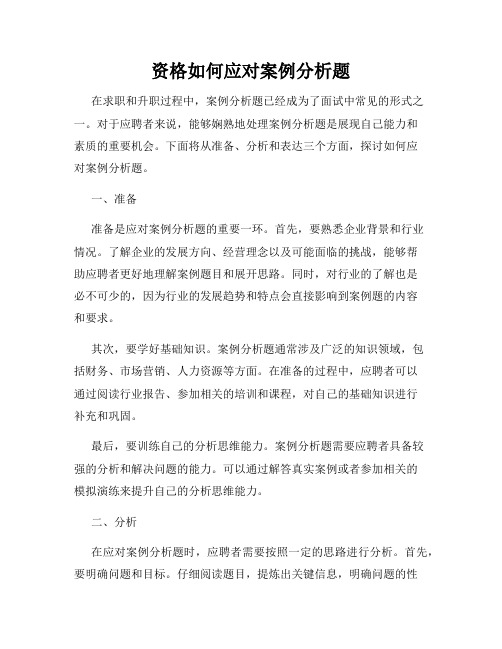
资格如何应对案例分析题在求职和升职过程中,案例分析题已经成为了面试中常见的形式之一。
对于应聘者来说,能够娴熟地处理案例分析题是展现自己能力和素质的重要机会。
下面将从准备、分析和表达三个方面,探讨如何应对案例分析题。
一、准备准备是应对案例分析题的重要一环。
首先,要熟悉企业背景和行业情况。
了解企业的发展方向、经营理念以及可能面临的挑战,能够帮助应聘者更好地理解案例题目和展开思路。
同时,对行业的了解也是必不可少的,因为行业的发展趋势和特点会直接影响到案例题的内容和要求。
其次,要学好基础知识。
案例分析题通常涉及广泛的知识领域,包括财务、市场营销、人力资源等方面。
在准备的过程中,应聘者可以通过阅读行业报告、参加相关的培训和课程,对自己的基础知识进行补充和巩固。
最后,要训练自己的分析思维能力。
案例分析题需要应聘者具备较强的分析和解决问题的能力。
可以通过解答真实案例或者参加相关的模拟演练来提升自己的分析思维能力。
二、分析在应对案例分析题时,应聘者需要按照一定的思路进行分析。
首先,要明确问题和目标。
仔细阅读题目,提炼出关键信息,明确问题的性质和目标。
其次,要收集和整理相关信息。
通过调研、采访等方式获取需要的数据,将信息整理成可视化的形式,便于观察和分析。
然后,要进行深入的分析和思考。
结合自己的专业知识和经验,通过对数据的分析和比较,找出问题的症结所在,并制定解决方案。
最后,要评估和反思。
对方案进行评估,考虑可行性和风险,同时对自己的解题过程进行反思和总结,以便在以后的面试中更加熟练地处理类似的案例。
三、表达在应对案例分析题时,良好的表达能力能够帮助应聘者更好地展示自己的思路和解决方案。
首先,要注意清晰和逻辑的表达。
在分析过程中,应聘者要有条理地讲述自己的思路,确保论证过程清晰、连贯,并体现出逻辑性。
其次,要注重数据的使用。
通过使用数据进行论证,可以增加方案的可信度。
同时,要注意将数据进行合理的解释和呈现,便于面试官理解。
案例面试的应对及技巧面试技巧提升系列第1期

案例面试的应对及技巧面试技巧提升系列第1期案例面试是常见的面试类型之一,比较常用于压力面试环节及结构化面试中。
以下就为您介绍案例面试的应对及技巧。
1、什么是案例面试。
案例面试,是通过应聘者对具体案例的判断和处理方法来了解应聘者的应变能力、做事风格、抗压能力等情况(根据案例的不同,考察点也有所不同),是考察应聘者的一种面试形式。
一般在案例面试中,面试官会讲述或者列出案例的背景信息,同时提出面临的问题或者所处的两难困境。
一般有口述形式、书面形式两种情况,以口述形式后团队讨论形式为多。
案例有真实的示例,也有虚构的。
应聘者根据案例情况给出自己的判断和处理方法或者建议。
2、案例面试实例示例1:一公司出售太阳能热水器,主要用于军营与户外活动。
销售样品每一位销售人员都有一部,在销售之前,每人手中的样品由销售人员必须进行清洗,而后送到检修部检修。
一般检修时间需要一个小时,但由于销售人员每次清洗的都不是很干净彻底,导致检修部的必须临时清洗,使得时间要两个小时。
一次两位销售人员同时各自送来一部机器,并且都未能彻底清洗,而检修部只有小王一人。
他们两个小时之后都要去见客户,并且两位客户一样重要。
两位销售人员要求不清洗直接进行检修。
如果你是检修部的小王,你会怎么做?案例分析及解答建议:“一次两位销售人员同时各自送来一部机器,并且都未能彻底清洗”所以检修部必须花两个小时时间进行清洗和检修,“两位销售人员要求不清洗直接进行检修”,这种方法可能会影响公司和产品的形象,所以小王应该说服销售人员按照标准流程彻底清洗后再检修,最后再见客户,然后再提出一个可行方案让两位客户都看到样品,比如可以先清洗一部,然后将两位客户约在一起,同时看一部样品。
示例2:小王是某公司的一名人事部基层员工,公司最近新来了一位人事经理是小王的直接上级,新来的人事经理给小王安排了一项工作任务并交待了执行的方案,由于新来的人事经理对公司情况并不十分熟悉,小王觉得根据公司情况这套执行方案会带来很多不利于公司的地方且增加不必要的工作量,经初步沟通后人事经理坚持用自己的方案来执行,小王应如何处理?案例分析及解答建议:小王作为下级是不应该与上级产生直接冲突的,面对这样的情况,小王先应继续用比较有说服力的方法与人事经理进行有效沟通,如果人事经理仍坚持方案,小王应分析这套方案带来后果的严重性,如果这套方案并不会带来负面影响而仅只是增加小王工作量的情况,小王应先按人事经理的方案执行然后根据执行情况不断保持反馈和沟通,如果这套方案会带来较大的负面影响,则应与经理道明利害冲突或越级汇报但又不影响关系的方法来避免方案执行带来的负面影响。
咨询业面试必看 case interview 及其经典案例分析
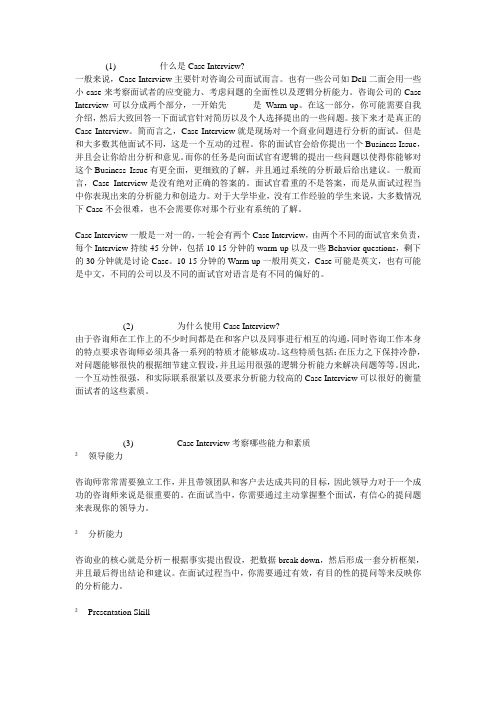
(1) 什么是Case Interview?一般来说,Case Interview主要针对咨询公司面试而言。
也有一些公司如Dell二面会用一些小case来考察面试者的应变能力、考虑问题的全面性以及逻辑分析能力。
咨询公司的Case Interview可以分成两个部分,一开始先是Warm-up。
在这一部分,你可能需要自我介绍,然后大致回答一下面试官针对简历以及个人选择提出的一些问题。
接下来才是真正的Case Interview。
简而言之,Case Interview就是现场对一个商业问题进行分析的面试。
但是和大多数其他面试不同,这是一个互动的过程。
你的面试官会给你提出一个Business Issue,并且会让你给出分析和意见。
而你的任务是向面试官有逻辑的提出一些问题以使得你能够对这个Business Issue有更全面,更细致的了解,并且通过系统的分析最后给出建议。
一般而言,Case Interview是没有绝对正确的答案的。
面试官看重的不是答案,而是从面试过程当中你表现出来的分析能力和创造力。
对于大学毕业,没有工作经验的学生来说,大多数情况下Case不会很难,也不会需要你对那个行业有系统的了解。
Case Interview一般是一对一的,一轮会有两个Case Interview,由两个不同的面试官来负责,每个Interview持续45分钟,包括10-15分钟的warm-up以及一些Behavior questions,剩下的30分钟就是讨论Case。
10-15分钟的Warm-up一般用英文,Case可能是英文,也有可能是中文,不同的公司以及不同的面试官对语言是有不同的偏好的。
(2) 为什么使用Case Interview?由于咨询师在工作上的不少时间都是在和客户以及同事进行相互的沟通,同时咨询工作本身的特点要求咨询师必须具备一系列的特质才能够成功。
这些特质包括:在压力之下保持冷静,对问题能够很快的根据细节建立假设,并且运用很强的逻辑分析能力来解决问题等等。
咨询面试题目(3篇)

第1篇一、案例分析题题目1:某知名电商企业近年来销售额持续增长,但客户满意度有所下降。
请结合以下信息,分析问题并提出解决方案。
背景信息:1. 企业近年来加大了市场投入,广告宣传力度加大。
2. 企业产品线丰富,涵盖服装、家居、食品等多个领域。
3. 企业在物流配送、售后服务等方面表现良好。
4. 客户满意度调查结果显示,客户对产品价格、品质、售后服务等方面满意度较高,但对购物体验、页面设计等方面满意度较低。
问题:1. 分析客户满意度下降的原因。
2. 针对问题,提出提升客户满意度的解决方案。
解析:1. 客户满意度下降的原因可能包括:a. 购物体验不佳,页面设计不够人性化,导致用户操作不便。
b. 市场竞争激烈,同类产品众多,用户选择余地较大。
c. 广告宣传过于集中,可能导致用户产生审美疲劳。
2. 提升客户满意度的解决方案:a. 优化页面设计,提高用户体验,如简化操作流程、优化产品展示等。
b. 加强与用户的互动,关注用户需求,提供个性化推荐。
c. 持续优化产品,提高产品质量,满足用户需求。
d. 调整广告宣传策略,避免过度宣传,注重品牌形象塑造。
题目2:某企业计划推出一款新产品,但市场调研结果显示,消费者对该产品的认知度较低。
请结合以下信息,分析问题并提出解决方案。
背景信息:1. 新产品属于高端市场,目标消费群体为年轻一代。
2. 企业在同类产品市场占有率较高,品牌知名度较高。
3. 新产品具有独特的设计和功能,但消费者对其认知度较低。
问题:1. 分析新产品认知度低的原因。
2. 针对问题,提出提升新产品认知度的解决方案。
解析:1. 新产品认知度低的原因可能包括:a. 产品宣传力度不足,未能有效触达目标消费群体。
b. 新产品与现有产品差异不大,未能引起消费者关注。
c. 消费者对新产品功能了解不足,难以产生购买欲望。
2. 提升新产品认知度的解决方案:a. 加强产品宣传,利用线上线下渠道,提高产品曝光度。
b. 突出产品特色,与现有产品形成差异化,吸引消费者关注。
如何应对求职面试中的案例分析问题
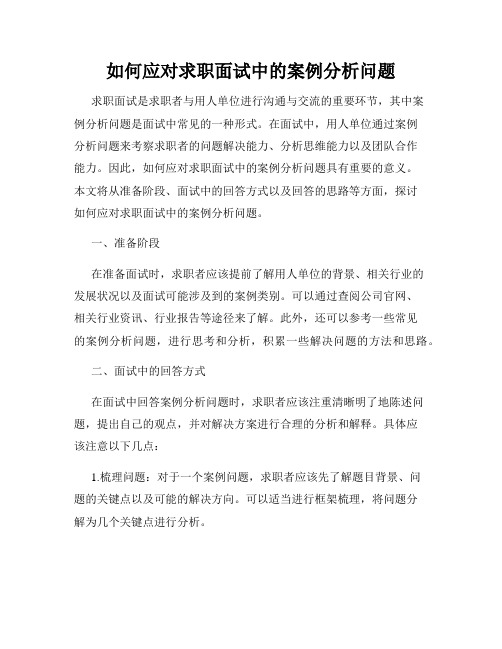
如何应对求职面试中的案例分析问题求职面试是求职者与用人单位进行沟通与交流的重要环节,其中案例分析问题是面试中常见的一种形式。
在面试中,用人单位通过案例分析问题来考察求职者的问题解决能力、分析思维能力以及团队合作能力。
因此,如何应对求职面试中的案例分析问题具有重要的意义。
本文将从准备阶段、面试中的回答方式以及回答的思路等方面,探讨如何应对求职面试中的案例分析问题。
一、准备阶段在准备面试时,求职者应该提前了解用人单位的背景、相关行业的发展状况以及面试可能涉及到的案例类别。
可以通过查阅公司官网、相关行业资讯、行业报告等途径来了解。
此外,还可以参考一些常见的案例分析问题,进行思考和分析,积累一些解决问题的方法和思路。
二、面试中的回答方式在面试中回答案例分析问题时,求职者应该注重清晰明了地陈述问题,提出自己的观点,并对解决方案进行合理的分析和解释。
具体应该注意以下几点:1.梳理问题:对于一个案例问题,求职者应该先了解题目背景、问题的关键点以及可能的解决方向。
可以适当进行框架梳理,将问题分解为几个关键点进行分析。
2.提出观点:在针对具体问题进行回答时,求职者可以先提出自己的观点和建议。
可以基于自己的实际经验、专业知识或者逻辑推理来提出解决方案。
3.分析论证:在提出观点后,求职者应该进行合理的分析和论证。
可以利用实例、数据、理论等方式来支撑自己的观点,并对每个方案的可行性、风险和效果进行评估。
4.结论总结:在回答完问题后,求职者应该进行总结和概括。
可以对提出的解决方案进行权衡,给出一个相对全面、客观的结论。
同时,还可以提出自己的思考和反思以及对整个案例的启示。
三、回答思路在回答案例分析问题时,求职者可以考虑以下几个方面的思路:1.系统思维:求职者应该能够从整体的角度来审视问题,并能够将问题进行梳理和分类。
可以通过思考问题的因果关系、逻辑衔接等方式来展示自己的系统思维能力。
2.逻辑思维:在回答问题时,求职者应该能够运用逻辑思维,将自己的观点和论证过程清晰地展示出来。
咨询公司面试案例分析指南咨询面试系列如何应付案例分析面试
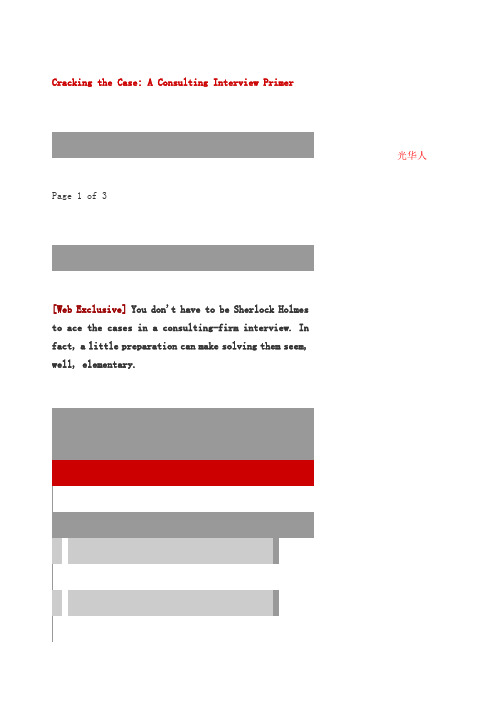
Cracking the Case: A Consulting Interview Primer光华人Page 1 of 3[Web Exclusive] You don't have to be Sherlock Holmesto ace the cases in a consulting-firm interview. Infact, a little preparation can make solving them seem,well, elementary.Remember your seventh-grade algebra teacher’s three favorite words? "Show your work." At the time, it seemed silly: Why not just show the right answer? Now that you’re older and wiser, however, you know that in many cases how you get to the right answer is more important than simply knowing the answer itself.The same goes for the case questions that consulting recruiters lob at you. Consulting is a demanding job with few "correct" answers; this method of interviewing gauges how well you manage the process of getting to an answer and how you perform under simulated client-engagement conditions.We talked to consultant-hunters at several firms to glean their advice on cracking the case interview. Here's what the recruiters revealed—and how you can best prepare.Why the Case Interview?Case interviews have long been used by recruiters to see a candidate's thought processes in motion. Can you deconstruct and analyze complex, open-ended business problems? Do you stay calm, or will you sweat bullets under pressure at a client site?At the most basic level, a case interview is aboutasking the right questions, developing a logical wayof working through the relevant issues, and arrivingat a recommendation. Your structure may be a packagedframework or it may be various frameworks strungtogether; you may even choose not to use frameworks atall. What's important is that you demonstrate somedefined structure.光华人“Case studies are an imperfect science,” concedesMichael Gibney, project manager atPricewaterhouse Coopers, “but are easilyimplementable in the 30 to 45 minutes we have for eachinterview.” Since they measure your analyticalskills, they're an improvement over simple "fit" or"resumé" interviews.In most case interviews, the recruiter gives you anexample of a real-life client problem. Some typicalcategories include:Company Strategy:“My client is thinking ofmaking an acquisition, and …”Brain Games:“How many tennis balls are in theUnited States?”Operations Improvement:“Why is my client’sfactory running behind?”Market Size:“How big is the global airconditioner market?”Although each requires a slightly different approach, all are meant mainly to evaluate the process you use, not the answer you come up with.Practice Makes PerfectYou absolutely, positively must prepare in advance for case interviews. “It becomes pretty clear pretty fast who has—and who has not—practiced,” says Gibney. “I know there is a basic sort of business acumen that may not be able to be practiced, but candidates must have an understandable approach to solving problems. That’s what our clients demand of us. If we can’t relate solutions to the client, it’s a problem.”Don’t assume that attending a case-oriented business school will give you an upper hand. John Flato, Cap Gemini Ernst & Young’s national director of university recruiting, says these candidates don’t seem to do any better or worse than candidates from non-case schools.Study different kinds of case questions. Just because your buddy interviewed before you and gave you a heads-up on the questions doesn’t mean you have a leg up. Recruiters have tons of case questions in theirrepertoire, and the chances of their using the samequestion multiple times on one campus visit are slim光华人to none.Get a classmate or friend to role-play the interviewwith you, and use any resources (such as a casebook)that your school's consulting club provides. The moremock cases you sink your teeth into, the more likelyyou are to be relaxed and poised for the real thing.Sometimes you learn more by presenting a case questionto someone than you do when solving the case yourself.Deliberately pick industries you're not familiar withso as to test your analytical skills, not memorizedfacts; for instance, if your pre-B-school experienceis mostly in media and entertainment, ask your casebuddy to ask you about steel production or medicaldevice marketing. That said, do consider brushing upon the basics in several industries—for instance,know the product development cycle in pharmaceuticalresearch, and understand current trends in technology.(For more information on various fields, check outour.) Although each case is different, with practiceyou will improve your analytical reasoning skills andsolution method.Think Through the ProcessWhen it comes to strategy or product marketing questions, the interviewer will often give you only the bare bones of a case and will wait for you to request further details: How many competitors does the company have? What are the major cost and revenue drivers? Who are the major clients? And don't forget to ask for the firm's mission—if you don't know what a company's goals are, you might come up with a valid—but misguided—solution. Use some basic frameworks to drive your questions—the four P's and the three C's, for instance.A sample question Gibney used recently involved a manufacturer/distributor/retailer of computer products. This client has traditionally gone directly to the consumer and has developed a solid brand image. The client now wants an assessment as to the issues relating to the core business, as well as the opportunities for the company to get into the services side, which it views as a high-margin/high-growth-rate business. The candidate now needs to provide an approach or evaluative framework for analyzing each of the two different problems.As long as it's permitted, work your answers out on paper. Pencils and pens, plus a notebook or legal pad should be standard equipment in an y interview. “It’s amazing how many people show up without a pen and paper,” marvels Kamenna Rindova, a senior associate光华人at Mercer Management Consulting. Thinking through allthe facts is a must, and you’re not going to do it allin your head.Page 2 of 3[Web Exclusive] You don't have to be Sherlock Holmesto ace the cases in a consulting-firm interview. Infact, a little preparation can make solving them seem,well, elementary.May the Five Forces (Not) Be with YouSome recruiters are turned off when potential hires draw on a packaged analytical framework (such as the five forces) to solve a problem. Others, however, are impressed. To be on the safe side, if you use a framework, don’t stray too far from the issue.If you do use one, choose wisely. If the case is about a business that's considering entry into an industry, Porter's five forces may indeed be your best bet. If you're talking about how products get from suppliers to end consumers, consider the value chain. Companies that are falling short on sales could use a profitability or cost vs. revenue analysis. If you're marketing a new pharmaceutical product, think about the 4 P's and the 3 C's."Is That Your Final Answer?"Don’t be afraid of pausing. Take the time to draw up notes and sketch out the problem. Don’t blurt anything out unnecessarily to end a period of silence. You’re not on a game show; you’re interviewing to be a consultant, which is a business as much about thinking光华人光华人as it is about communicating. Above all, be calm.If you do respond to a question too quickly, before understanding all the facts, you may end up contradicting yourself halfway through your response—which could be disastrous. “In our environment and our industry,” says Sean Huurman, national recruiting director of KPMG Consulting, “we need to make sure we’re saying the right thing the first time.”After all the analysis, however, don't forget to come to some kind of conclusion as to what the company should do. Consider presenting a decision rule that the imaginary organization could use to figure out what the best option is—., if revenues outstrip costs, then do x.Follow the LeaderMany firms use a group exercise in their second or subsequent rounds to see how well you work with others. If you’re assigned a role other than team leader, don’t fret. It doesn’t matter what your role is in the exercise—just do it well. If you and the team members are told to settle between yourselves who gets to do what, don’t fight over who gets to make the presentation or lead the group. Likewise, don’t playthe shrinking violet. Remember, the recruiter is watching.Whatever you do, show confidence, not arrogance. A display of ego before John Flato at Cap Gemini Ernst & Young is a certain red flag. “Obviously, those who go to business schools are bright and talented—they wouldn’t be there otherwise,” Flato remarks. “We hire bright and talented people, but only those who can work well with team members and not display arrogance.”Page 3 of 3[Web Exclusive] You don't have to be Sherlock Holmes to ace the cases in a consulting-firm interview. In fact, a little preparation can make solving them seem, well, elementary.Ready for some company-specific advice? Here's what five recruiters told us about interviewing at their firms.The Questions:Words of Wisdom:Coveney points out that she doesn’t have a preference regarding how a candidate initially reacts to the case interview question. “Some people take some time to formulate their thoughts, other people ask a few questions, and other people jump right in,” Cov eneysays. “Relax and take your time, focus on the specific issues of the case, remember there is no one right answer to the case, and don’t use too many frameworks. Don’t throw in the kitchen sink, like Porter’s five forces, etc. Just be confident, and relax—it will really help with the interview.”Recruiter No. 2: Kamenna Rindova, senior associate, Mercer Management ConsultingThe Questions:MMC asks most candidates one-on-one questions and doesn’t often do group exercises. Reflecting the firm’s focu s, most questions deal with strategy issues, with occasional market sizing questions thrown in. The purpose of the interview for MMC is to see the candidate's ability to structure and think through a problem as they would on the job.Words of Wisdom:Rindova says practice and familiarity with cases is essential, and stresses that an interview can go south if the candidate loses sight of the structure he or she is building. Lastly, beating a clear path to any response is more important than getting it righ t. “Youcan give (a recruiter) a wrong answer, but if you thought out loud through the process, you could still have a stellar interview,” Rindova concludes.Recruiter No. 3: Scott Berney, head of . recruiting operations, Monitor GroupThe Questions:Determining a person’s analytical skills, comfort with manipulating numbers, and ability to integrate different pieces of data is the purpose of the case interview for Monitor Group. For the first round of interviews, case questions are usually written and are two to three pages in length. In the final round, a group event is used.Words of Wisdom:Recruiter No. 4: Sean Huurman, national recruiting director, KPMG ConsultingThe Questions:“The case question helps get to a thinking process andvarious characteristics of a candidate you don’tnecessarily get in an ordinary interview,” saysHuurman. “When we use cases, we are really focusingon things that tie into the client.” The typical KPMGconsultant hunter wants to know how a candidate cancommunicate with the team, their leadership, and theclient.Huurman favors group interviews, and knows a lot ofcandidates can be prepped in advance, but he notes thatthere’s "no amount of coaching" that can prepare you光华人for a group project.Words of Wisdom:“Too many people jump right into the case study anddon’t put any thought into it,” says Huurman. “Iwant the interviewees to think things through.” KPMGrecruiters are always told to let the candidate havesome time to think through the case, but Huurmanindicates that very few candidates take advantage ofit.Huurman admits that few recruiters would askinterviewees what KPMG stands for (curious? It's Klynveld, Peat, Marwick, and Goerdeler), but it’s important to do your homework on the fir m’s services, strengths, and culture.Recruiter No. 5: Michael Gibney, project manager, PricewaterhouseCoopersThe Questions:Some of PwC’s competencies don’t require that a case question be asked, but it’s probably best to plan for one. Interviews are typically one-on-one and are meant to test the business acumen of a candidate. Seeing candidates' insight into business problems and their approach to solving them (most questions are based on true-life client engagements) is the overall goal.Words of Wisdom:Gibney understands that many problems are too big to solve during the course of a half-hour interview, but wants to see a firm grasp of key issues. “The candidate must have an understanding of the overall situation and the overall problem, and then create an approach to solve it,” Gibney says. “For instance, if we’re talking about a client getting into the servicesbusiness, I would expect to see some kind of framework around identifying what relevant services would be, and the different market and company factors involved.I want the candidate to relate directly what the core issues are.”Michael K. Norris is an expert in consulting and consultant recruitment issues. He can be reached at.。
咨询公司案例面试题

咨询公司案例面试题及应对1.战略规划:假设你是一家咖啡公司的CEO,公司正面临着市场份额下降和竞争对手增加的挑战。
你该如何制定新的战略来改善公司的业绩?2.市场进入:一家国际快餐品牌想进入一个新的国家市场,你该如何评估市场的潜力和风险?3.产品定价:你是一家汽车制造商的产品经理,公司计划推出一款新的电动车。
你该如何确定产品的定价策略,以便在市场上获得竞争力?4.运营优化:你是一家医院的副院长,医院的手术室效率低下,导致患者等待时间过长。
你该如何优化手术室的运营管理?5.组织变革:你是一家大型企业的组织发展经理,公司正面临着组织结构臃肿、流程繁琐的挑战。
你该如何设计和实施组织变革计划?6.数字营销:你是一家服装品牌的数字营销经理,公司计划推出一系列新的产品线。
你该如何制定数字营销策略来吸引和留住消费者?7.风险管理:你是一家银行的风险管理总监,银行正面临着日益增长的市场风险和信用风险。
你该如何制定有效的风险管理策略?8.供应链管理:你是一家快时尚品牌的供应链经理,公司计划扩大产品线并增加新的供应商。
你该如何优化供应链管理以提高效率和降低成本?9.组织文化:你是一家科技公司的组织文化经理,公司正面临着员工流失率和士气低落的挑战。
你该如何设计和实施组织文化变革计划?10.定制化服务:你是一家旅游公司的定制化服务部门经理,公司正面临着客户满意度低和定制化服务需求增加的挑战。
你该如何优化定制化服务流程以提高客户满意度?以上是咨询公司案例面试中可能出现的题目,它们考察的是候选人的分析能力、商业洞察力和解决问题的能力。
在回答这些问题时,建议按照以下步骤进行:1.确定问题的核心和目标。
2.分析问题并找出关键因素。
3.提供可行的解决方案和建议。
4.阐述你的思考过程和依据。
5.强调你的分析和解决问题的能力。
6.同时,也要注意在回答问题时要表现出自信、有条理、有逻辑性和沟通能力的一面。
面试咨询公司如何分析案例.doc
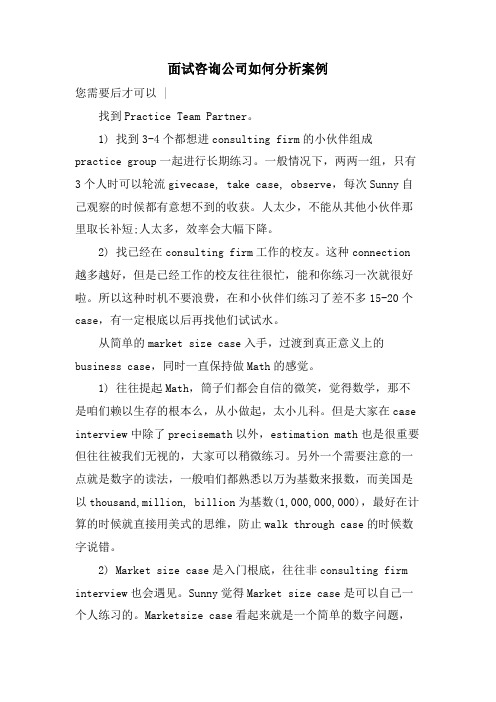
面试咨询公司如何分析案例您需要后才可以 |找到Practice Team Partner。
1) 找到3-4个都想进consulting firm的小伙伴组成practice group一起进行长期练习。
一般情况下,两两一组,只有3个人时可以轮流givecase, take case, observe,每次Sunny自己观察的时候都有意想不到的收获。
人太少,不能从其他小伙伴那里取长补短;人太多,效率会大幅下降。
2) 找已经在consulting firm工作的校友。
这种connection 越多越好,但是已经工作的校友往往很忙,能和你练习一次就很好啦。
所以这种时机不要浪费,在和小伙伴们练习了差不多15-20个case,有一定根底以后再找他们试试水。
从简单的market size case入手,过渡到真正意义上的business case,同时一直保持做Math的感觉。
1) 往往提起Math,筒子们都会自信的微笑,觉得数学,那不是咱们赖以生存的根本么,从小做起,太小儿科。
但是大家在case interview中除了precisemath以外,estimation math也是很重要但往往被我们无视的,大家可以稍微练习。
另外一个需要注意的一点就是数字的读法,一般咱们都熟悉以万为基数来报数,而美国是以thousand,million, billion为基数(1,000,000,000),最好在计算的时候就直接用美式的思维,防止walk through case的时候数字说错。
2) Market size case是入门根底,往往非consulting firm interview也会遇见。
Sunny觉得Market size case是可以自己一个人练习的。
Marketsize case看起来就是一个简单的数字问题,比方,全美迪士尼每年能卖多少张票?全美每年生产多少个篮球?这种问题往往答案都是一个数字,但是数字本身并不重要。
咨询公司案例面试
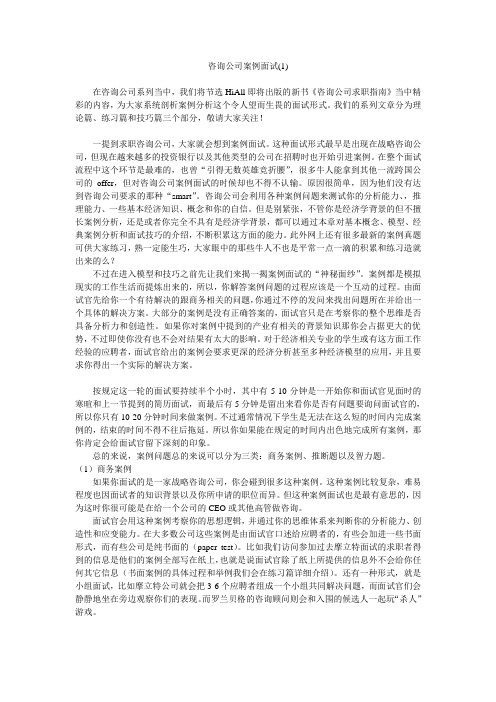
咨询公司案例面试(1)在咨询公司系列当中,我们将节选HiAll即将出版的新书《咨询公司求职指南》当中精彩的内容,为大家系统剖析案例分析这个令人望而生畏的面试形式。
我们的系列文章分为理论篇、练习篇和技巧篇三个部分,敬请大家关注!一提到求职咨询公司,大家就会想到案例面试。
这种面试形式最早是出现在战略咨询公司,但现在越来越多的投资银行以及其他类型的公司在招聘时也开始引进案例。
在整个面试流程中这个环节是最难的,也曾“引得无数英雄竞折腰”,很多牛人能拿到其他一流跨国公司的offer,但对咨询公司案例面试的时候却也不得不认输。
原因很简单,因为他们没有达到咨询公司要求的那种“smart”。
咨询公司会利用各种案例问题来测试你的分析能力、,推理能力、一些基本经济知识、概念和你的自信。
但是别紧张,不管你是经济学背景的但不擅长案例分析,还是或者你完全不具有是经济学背景,都可以通过本章对基本概念、模型、经典案例分析和面试技巧的介绍,不断积累这方面的能力。
此外网上还有很多最新的案例真题可供大家练习,熟一定能生巧,大家眼中的那些牛人不也是平常一点一滴的积累和练习造就出来的么?不过在进入模型和技巧之前先让我们来揭一揭案例面试的“神秘面纱”。
案例都是模拟现实的工作生活而提炼出来的,所以,你解答案例问题的过程应该是一个互动的过程。
由面试官先给你一个有待解决的跟商务相关的问题,你通过不停的发问来找出问题所在并给出一个具体的解决方案。
大部分的案例是没有正确答案的,面试官只是在考察你的整个思维是否具备分析力和创造性。
如果你对案例中提到的产业有相关的背景知识那你会占据更大的优势,不过即使你没有也不会对结果有太大的影响。
对于经济相关专业的学生或有这方面工作经验的应聘者,面试官给出的案例会要求更深的经济分析甚至多种经济模型的应用,并且要求你得出一个实际的解决方案。
按规定这一轮的面试要持续半个小时,其中有5-10分钟是一开始你和面试官见面时的寒暄和上一节提到的简历面试,而最后有5分钟是留出来看你是否有问题要询问面试官的,所以你只有10-20分钟时间来做案例。
咨询面试系列如何应付案例分析面试

咨询面试系列如何应付案例分析面试在咨询行业中,案例分析面试是非常常见的面试形式。
此类面试主要在测试面试者的分析能力、解决问题的能力和工作方式。
与其他面试形式相比,案例分析面试更能真实反映出应聘者在实际工作中的综合素质,因此备战此类面试显得尤为重要。
接下来,我将针对如何应对案例分析面试,从面试前、面试时、面试后三个时间节点进行分析。
一、面试前:1、准备背景知识在面试前,应聘人员需要对雇主的行业、公司背景、公司战略等方面进行调研和了解,为自己的面试做好充分的背景知识准备。
此外,还需要了解咨询行业的常见案例、解决方案等方面的知识,来提高自己的答题水平。
2、提前进行练习练习可有效理清思路、提高应变能力,并能够查出答题中存在的问题,及时解决。
在练习过程中,应聘人员需要注重以下几点:(1)时间管理:案例分析面试一般都有时间限制,因此需要在日常练习中注意控制时间,并且尽量在时间内完成。
(2)结构清晰:答题时需要有条理、有头有尾,采用逻辑清晰的结构,为面试官呈现出一个完整的解决方案。
(3)纵深分析:要根据实际情况,进行深入的分析,建立一定的分析框架,并以其为基础进行深入分析。
3、了解面试官在面试前要对面试官进行了解,了解他们的背景、兴趣爱好、所从事的业务领域等信息,及时调整自己的表现和沟通方式。
二、面试时:1、理清案例在接到案例后,首先需要花费较长时间来理清案例的整体情况,了解案例中的重点问题、核心需求以及所展现的痛点。
如果在理清全局之后,还能梳理出一定的分析框架,建立逻辑清晰的结构体系,解题效率就会大大提高。
2、分析问题在理清案例之后,应进一步分析其中的问题,进行各种分析,如SWOT分析,5C分析等,从而找出问题所在,并提供相应的解决方案。
要注意的是,在分析问题时需要保持逻辑清晰、条理明显。
3、提出解决方案成功的案例分析面试最后的关键点就在于提出准确合理的解决方案。
在制定解决方案时落实可行性,注重实际。
此外,还需有清晰的逐步推进方案,如需要实现的任务、实现它们的范围、时间进度、所需要的资源、负责和参与者等。
案例面试及应对策略
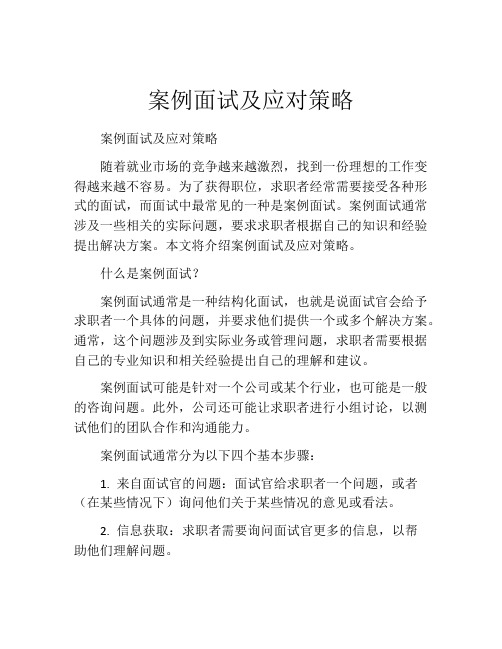
案例面试及应对策略案例面试及应对策略随着就业市场的竞争越来越激烈,找到一份理想的工作变得越来越不容易。
为了获得职位,求职者经常需要接受各种形式的面试,而面试中最常见的一种是案例面试。
案例面试通常涉及一些相关的实际问题,要求求职者根据自己的知识和经验提出解决方案。
本文将介绍案例面试及应对策略。
什么是案例面试?案例面试通常是一种结构化面试,也就是说面试官会给予求职者一个具体的问题,并要求他们提供一个或多个解决方案。
通常,这个问题涉及到实际业务或管理问题,求职者需要根据自己的专业知识和相关经验提出自己的理解和建议。
案例面试可能是针对一个公司或某个行业,也可能是一般的咨询问题。
此外,公司还可能让求职者进行小组讨论,以测试他们的团队合作和沟通能力。
案例面试通常分为以下四个基本步骤:1. 来自面试官的问题:面试官给求职者一个问题,或者(在某些情况下)询问他们关于某些情况的意见或看法。
2. 信息获取:求职者需要询问面试官更多的信息,以帮助他们理解问题。
3. 分析和提出解决方案:求职者根据自己的知识和相关经验对问题进行分析,并提出一个或多个解决方案。
4. 总结和演示:最后,求职者需要总结自己的解决方案并向面试官演示他们的方案。
应对策略1. 准备工作充分首先,你需要对公司和行业进行深入了解。
这不仅仅涉及公司或行业的历史和业务模式,还包括其目标、竞争对手、市场趋势和未来趋势。
理解这些方面能帮助你在面试中更好地回答问题。
2. 练习思考和分析在案例面试中,你需要使用自己的专业知识和相关经验来解决问题。
要达到这样的目标,需要训练思考和分析的能力。
你可以阅读相关文章、书籍或参加行业研讨会,获得更多的知识和信息。
3. 练习团队协作和沟通在案例面试中,你可能需要与其他的求职者一起工作。
这时候需要发挥协作和沟通的能力。
练习与组员沟通交流和协调,能帮助你在面试中更好地表现出你的能力。
4. 注重解决方案的创新性面试官需要看到你的解决方案是有创意的。
【海归招聘】咨询行业的面试里面,案例分析如何下手?
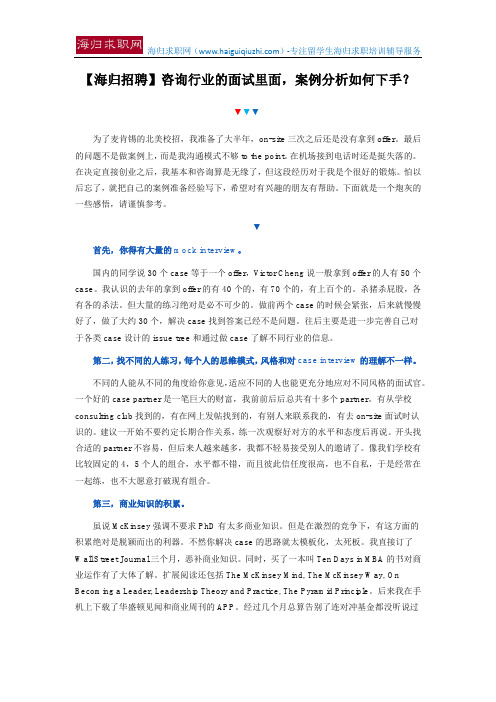
【海归招聘】咨询行业的面试里面,案例分析如何下手?▼▼▼为了麦肯锡的北美校招,我准备了大半年,on-site三次之后还是没有拿到offer。
最后的问题不是做案例上,而是我沟通模式不够to the point。
在机场接到电话时还是挺失落的。
在决定直接创业之后,我基本和咨询算是无缘了,但这段经历对于我是个很好的锻炼。
怕以后忘了,就把自己的案例准备经验写下,希望对有兴趣的朋友有帮助。
下面就是一个炮灰的一些感悟,请谨慎参考。
▼首先,你得有大量的mock interview。
国内的同学说30个case等于一个offer,Victor Cheng说一般拿到offer的人有50个case。
我认识的去年的拿到offer的有40个的,有70个的,有上百个的。
杀猪杀屁股,各有各的杀法。
但大量的练习绝对是必不可少的。
做前两个case的时候会紧张,后来就慢慢好了,做了大约30个,解决case找到答案已经不是问题。
往后主要是进一步完善自己对于各类case设计的issue tree和通过做case了解不同行业的信息。
第二,找不同的人练习,每个人的思维模式,风格和对case interview的理解不一样。
不同的人能从不同的角度给你意见,适应不同的人也能更充分地应对不同风格的面试官。
一个好的case partner是一笔巨大的财富,我前前后后总共有十多个partner。
有从学校consulting club找到的,有在网上发帖找到的,有别人来联系我的,有去on-site面试时认识的。
建议一开始不要约定长期合作关系,练一次观察好对方的水平和态度后再说。
开头找合适的partner不容易,但后来人越来越多,我都不轻易接受别人的邀请了。
像我们学校有比较固定的4,5个人的组合,水平都不错,而且彼此信任度很高,也不自私,于是经常在一起练,也不大愿意打破现有组合。
第三,商业知识的积累。
虽说McKinsey强调不要求PhD有太多商业知识。
但是在激烈的竞争下,有这方面的积累绝对是脱颖而出的利器。
案例面试及应对策略

多角度思考
在分析案例时,要尝试从不同角 度进行思考,例如从客户、竞争 对手、行业趋势等角度进行分析 ,以便更全面地了解情况并给出
有效的解决方案。
感谢您的观看
THANKS
05
案例面试的误区与改进方 法
缺乏分析能力
01
总结词
在案例面试中,分析能力不足是常见的误区之一。
02 03
详细描述
面试官通常会提供一个简短的案例描述,然后要求候选人分析并给出解 决方案。缺乏分析能力可能导致候选人无法全面地理解问题,从而在分 析时遗漏重要信息或误解问题的本质。
改进方法
培养分析能力需要积累经验和练习。在面试准备阶段,可以通过模拟案 例进行训练,注重逻辑思考和结构化分析,逐步提高分析问题的能力。
决策分析类案例
总结词
决策分析能力
问题示例
你曾经在工作中面临一个重要的决策,如何做的?
详细描述
决策分析类案例要求你分析复杂的情况,并做出明智的决 策。面试官会询问你在过去的工作或生活中做出的某个决 策过程和结果。
应对策略
清晰地描述决策的背景和相关信息,说明你考虑了哪些因 素,以及你最终选择的方案。解释你的决策对结果的影响 ,以及你从中学到的经验教训。
有条理地表达观点
总结词:清晰表达
详细描述:考生应具备清晰、连贯和有条理的表达能力,能 够将自己的观点和解决方案简明扼要地表达出来。在表达过 程中,考生应注意使用专业术语和规范化的语言,同时注意 逻辑性和说服力。
保持冷静与自信
总结词:沉着冷静
VS
详细描述:在案例面试中,考生应保 持沉着冷静、自信的心态。即使遇到 困难或不确定的问题,也应保持镇定 自若,避免因紧张或焦虑而影响发挥 。同时,考生应相信自己的能力和准 备程度,对自己的观点和解决方案有 充分的信心。
案例分析如何回答一系列的面试问题
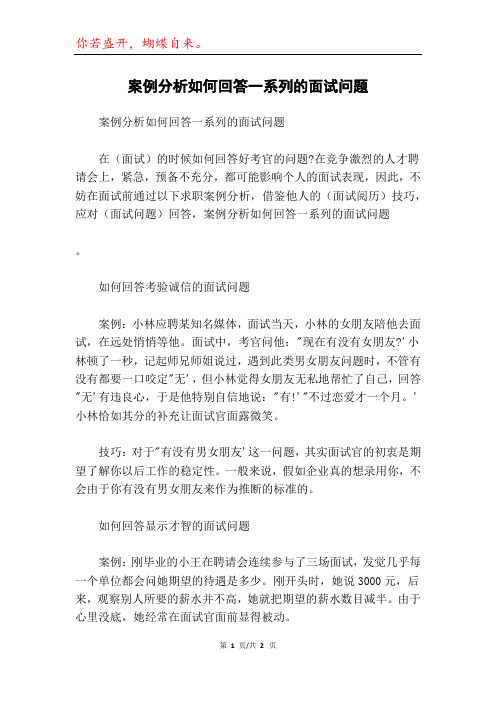
你若盛开,蝴蝶自来。
案例分析如何回答一系列的面试问题案例分析如何回答一系列的面试问题在(面试)的时候如何回答好考官的问题?在竞争激烈的人才聘请会上,紧急,预备不充分,都可能影响个人的面试表现,因此,不妨在面试前通过以下求职案例分析,借鉴他人的(面试阅历)技巧,应对(面试问题)回答,案例分析如何回答一系列的面试问题。
如何回答考验诚信的面试问题案例:小林应聘某知名媒体,面试当天,小林的女朋友陪他去面试,在远处悄悄等他。
面试中,考官问他:"现在有没有女朋友?'小林顿了一秒,记起师兄师姐说过,遇到此类男女朋友问题时,不管有没有都要一口咬定"无',但小林觉得女朋友无私地帮忙了自己,回答"无'有违良心,于是他特别自信地说:"有!'"不过恋爱才一个月。
'小林恰如其分的补充让面试官面露微笑。
技巧:对于"有没有男女朋友'这一问题,其实面试官的初衷是期望了解你以后工作的稳定性。
一般来说,假如企业真的想录用你,不会由于你有没有男女朋友来作为推断的标准的。
如何回答显示才智的面试问题案例:刚毕业的小王在聘请会连续参与了三场面试,发觉几乎每一个单位都会问她期望的待遇是多少。
刚开头时,她说3000元,后来,观察别人所要的薪水并不高,她就把期望的薪水数目减半。
由于心里没底,她经常在面试官面前显得被动。
第1页/共2页千里之行,始于足下。
技巧:薪水问题是面试中绕不过的问题。
假如对薪酬要求太低,那明显贬低自己的力量;假如对薪酬要求太高,那又会显得自己自视过高,公司用不起,资料共享平台《案例分析如何回答一系列的面试问题》(https://.unjs)。
很多毕业生于是避实就虚:不做正面回答,强调自己最感爱好的是工作的.机会。
然而这样中性的回答往往不能让面试官满足。
职场专家建议,求职者最好多方了解一下相关资料,协作个人的阅历、力量等条件,作出最基本的薪资底限。
面试时如何应对咨询行业的案例分析
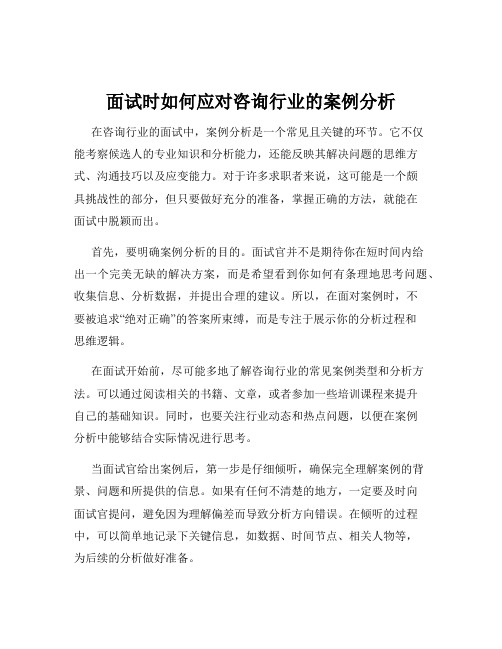
面试时如何应对咨询行业的案例分析在咨询行业的面试中,案例分析是一个常见且关键的环节。
它不仅能考察候选人的专业知识和分析能力,还能反映其解决问题的思维方式、沟通技巧以及应变能力。
对于许多求职者来说,这可能是一个颇具挑战性的部分,但只要做好充分的准备,掌握正确的方法,就能在面试中脱颖而出。
首先,要明确案例分析的目的。
面试官并不是期待你在短时间内给出一个完美无缺的解决方案,而是希望看到你如何有条理地思考问题、收集信息、分析数据,并提出合理的建议。
所以,在面对案例时,不要被追求“绝对正确”的答案所束缚,而是专注于展示你的分析过程和思维逻辑。
在面试开始前,尽可能多地了解咨询行业的常见案例类型和分析方法。
可以通过阅读相关的书籍、文章,或者参加一些培训课程来提升自己的基础知识。
同时,也要关注行业动态和热点问题,以便在案例分析中能够结合实际情况进行思考。
当面试官给出案例后,第一步是仔细倾听,确保完全理解案例的背景、问题和所提供的信息。
如果有任何不清楚的地方,一定要及时向面试官提问,避免因为理解偏差而导致分析方向错误。
在倾听的过程中,可以简单地记录下关键信息,如数据、时间节点、相关人物等,为后续的分析做好准备。
接下来,对案例进行结构化的分析。
可以采用常见的框架,如SWOT 分析(优势、劣势、机会、威胁)、波特五力模型、PEST 分析(政治、经济、社会、技术)等。
这些框架能够帮助你系统地梳理问题,找出关键因素,并进行有条理的阐述。
但要注意,不要生搬硬套框架,而是根据案例的具体情况灵活运用。
在分析过程中,要善于运用逻辑推理和数据支持。
通过对所给信息的整合和推理,逐步得出结论。
如果有相关的数据,要对其进行仔细的分析和解读,用数据来支撑你的观点。
同时,也要考虑到不同因素之间的相互关系和影响,展现出全面、深入的思考能力。
除了分析问题,还要提出切实可行的解决方案。
解决方案要具有针对性和可操作性,能够解决案例中提出的问题。
在提出方案时,可以考虑多个备选方案,并对每个方案的优缺点进行分析,最终给出一个你认为最优的方案。
- 1、下载文档前请自行甄别文档内容的完整性,平台不提供额外的编辑、内容补充、找答案等附加服务。
- 2、"仅部分预览"的文档,不可在线预览部分如存在完整性等问题,可反馈申请退款(可完整预览的文档不适用该条件!)。
- 3、如文档侵犯您的权益,请联系客服反馈,我们会尽快为您处理(人工客服工作时间:9:00-18:30)。
Crac king the Case: A Consulting I n t e r v i e w P r i m e rPage 1 of 3[Web Exclusive] You don't have to be Sherlock Holmes to ace the cases in a consulting-firm interview. In fact, a little preparation can make solving them seem, well, elementary.Remember your seventh-grade algebra teacher’s three favorite words光华人向上的精神"Show your work." At the time, it seemed silly: Why not just show the right answer Now that you’re older and wiser, however, you know that in many cases how you get to the right answer is more important than simply knowing the answer itself.The same goes for the case questions that consulting recruiters lob at you. Consulting is a demanding job with few "correct" answers; this method of interviewing gauges how well you manage the process of getting to an answer and how you perform under simulated client-engagement conditions.We talked to consultant-hunters at several firms to glean their advice on cracking the case interview. Here's what the recruiters revealed—and how you can best prepare.Why the Case Interview?Case interviews have long been used by recruiters to see a candidate'sthought processes in motion. Can you deconstruct and analyze complex, open-ended business problems Do you stay calm, or will you sweat bullets under pressure at a client siteAt the most basic level, a case interview is about asking the right questions, developing a logical way of working through the relevant issues, and arriving at a recommendation. Your structure may be a packaged framework or it may be various frameworks strung together; you may even choose not to use frameworks at all. What's important is that you demonstrate some defined structure.“Case studies are an imperfect science,” concedes Michael Gibney, project manager at PricewaterhouseCoopers, “but are easily implementable in the 30 to 45 m inutes we have for each interview.” Since they measure your analytical skills, they're an improvement over simple "fit" or "resumé" interviews.In most case interviews, the recruiter gives you an example of a real-life client problem. Some typical categories include:•Company Strategy:“My client is thinking of making an acquisition, and …”•Brain Games:“How many tennis balls are in the United States”•Operations Improvement:“Why is my client’s factory running behind”•Market Size:“How big is the global air conditioner market” Although each requires a slightly different approach, all are meant mainly光华人向上的精神to evaluate the process you use, not the answer you come up with.Practice Makes PerfectYou absolutely, positively must prepare in advance for case interviews. “It becomes pretty clear pretty fast who has—and who has not—practiced,” says Gibney. “I know there is a basic sort of business acumen that may not be able to be practiced, but candidates must have an understandable approach to solving problems. That’s what our clients demand of us. If we can’t relate solutions to the client, it’s a problem.”Don’t assume that attending a case-oriented business school will give you an upper hand. John Flato, Cap Gemini Ernst & Young’s nation al director of university recruiting, says these candidates don’t seem to do any better or worse than candidates from non-case schools.Study different kinds of case questions. Just because your buddy interviewed before you and gave you a heads-up on the questionsdoesn’t mean you have a leg up. Recruiters have tons of case questions in their repertoire, and the chances of their using the same question multiple times on one campus visit are slim to none.Get a classmate or friend to role-play the interview with you, and use any resources (such as a casebook) that your school's consulting club provides. The more mock cases you sink your teeth into, the more likely you are to be relaxed and poised for the real thing. Sometimes you learn more by presenting a case question to someone than you do when solving the case yourself.Deliberately pick industries you're not familiar with so as to test your analytical skills, not memorized facts; for instance, if your pre-B-school experience is mostly in media and entertainment, ask your case buddy to ask you about steel production or medical device marketing. That said, do consider brushing up on the basics in several industries—for instance, know the product development cycle in pharmaceutical research, and understand current trends in technology. (For more information on various fields, check out our .) Although each case is different, with practice you will improve your analytical reasoning skills and solution method.Think Through the ProcessWhen it comes to strategy or product marketing questions, the interviewer will often give you only the bare bones of a case and will wait for you to request further details: How many competitors does the company have What are the major cost and revenue drivers Who are the major clients And don't forget to ask for the firm's mission—if you don't光华人向上的精神know what a company's goals are, you might come up with a valid—but misguided—solution. Use some basic frameworks to drive your questions—the four P's and the three C's, for instance.A sample question Gibney used recently involved a manufacturer/distributor/retailer of computer products. This client has traditionally gone directly to the consumer and has developed a solid brand image. The client now wants an assessment as to the issues relating to the core business, as well as the opportunities for the company to get into the services side, which it views as a high-margin/high-growth-rate business. The candidate now needs toprovide an approach or evaluative framework for analyzing each of the two different problems.As long as it's permitted, work your answers out on paper. Pencils and pens, plus a notebook or legal pad should be standard equipment in any interview. “It’s amazing how many people show up without a pen a nd paper,” marvels Kamenna Rindova, a senior associate at Mercer Management Consulting. Thinking through all the facts is a must, and you’re not going to do it all in your head.Page 2 of 3[Web Exclusive] You don't have to be Sherlock Holmes to ace the cases in a consulting-firm interview. In fact, a little preparation can make solving them seem, well, elementary.光华人向上的精神May the Five Forces (Not) Be with You3 C's."Is That Your Final Answer"Don’t be afraid of pausing. T ake the time to draw up notes and sketch out the problem. Don’t blurt anything out unnecessarily to end a period of silence. You’re not on a game show; you’re interviewing to be a consultant, which is a business as much about thinking as it is about communicating. Above all, be calm.If you do respond to a question too quickly, before understanding all the facts, you may end up contradicting yourself halfway through your response—which could be disastrous. “In our environment and our industry,” says Sean Huurman, national recruiting director of KPMG Consulting, “we need to make sure we’re saying the right thing the first time.”After all the analysis, however, don't forget to come to some kind of conclusion as to what the company should do. Consider presenting a decision rule that the imaginary organization could use to figure out what the best option is—., if revenues outstrip costs, then do x.Follow the LeaderMany firms use a group exercise in their second or subsequent rounds to see how well you work with others. If you’re assigned a role other than team leader, don’t fret. It doesn’t matter what your role is in the exercise—just do it well. If you and the team members are told to settle between yourselves who gets to do what, don’t fight over who gets to make the presentation or lead the group. Likewise, don’t play the shrinking violet. Remember, the recruiter is watching.Whatever you do, show confidence, not arrogance. A display of ego before John Flato at Cap Gemini Ernst & Young is a certain red flag.光华人向上的精神光华人向上的精神“Obviously, those who go to business schools are bright and talented—they wouldn’t be there otherwise,” Flato remarks. “We hire bright and talented people, but only those who can work well with team members and not display arrogance.”Page 3 of 3[Web Exclusive] You don't have to be Sherlock Holmes to ace the cases in a consulting-firm interview. In fact, a little preparation can make solving them seem, well, elementary.Ready for some company-specific advice Here's what five recruiters told us about interviewing at their firms.The Questions:Words of Wisdom:Coveney points out that she doesn’t have a preference regarding how a candidate initially reacts to the case interview question. “Some people take some time to formulate their thoughts, other people ask a few questions, and other people jump right in,” Coveney says. “Relax and take your time, focus on the specific issues of the case, remember there is no one right answer to the case, and don’t use to o many frameworks. Don’t throw in the kitchen sink, like Porter’s five forces, etc. Just be confident, and relax—it will really help with the interview.”Recruiter No. 2: Kamenna Rindova, senior associate, Mercer Management ConsultingThe Questions:MMC asks most candidates one-on-one questions and doesn’t often do group exercises. Reflecting the firm’s focus, most questions deal with strategy issues, with occasional market sizing questions thrown in. The purpose of the interview for MMC is to see the candidate's ability to structure and think through a problem as they would on the job.Words of Wisdom:Rindova says practice and familiarity with cases is essential, and stresses that an interview can go south if the candidate loses sight of the structure he or she is building. Lastly, beating a clear path to any response is more important than getting it right. “You can give (a recruiter) a wrong answer, but if you thought out loud through the process, you could still have a stellar interview,” Rindova concludes.Recruiter No. 3: Scott Berney, head of . recruiting operations, Monitor GroupThe Questions:Determining a person’s analytical skills, comfort with manipulating numbers, and ability to integrate different pieces of data is the purpose of the case interview for Monitor Group. For the first round of interviews, case questions are usually written and are two to three pages in length. In the final round, a group event is used.Words of Wisdom:Recruiter No. 4: Sean Huurman, national recruiting director, KPMG ConsultingThe Questions:“The case question helps get to a thinking process and various characteristics of a candidate you don’t necessarily get in an ordinaryinterview,” says Huurman. “When we use cases, we are really focusing on things that tie into the client.” The typical KPMG consultant hunter wants to know how a candidate can communicate with the team, their leadership, and the client.Huurman favors group interviews, and knows a lot of candidates can be prepped in advance, but he notes that there’s "no amount of coaching" that can prepare you for a group project.Words of Wisdom:“Too many people jump right into the case study and don’t put any thought into it,” says Huurman. “I want the interviewees to think things through.” KPMG recruiters are always told to let the candidate have some time to think through the case, but Huurman indicates that very few candidates take advantage of it.Huurman admits that few recruiters would ask interviewees what KPMG stands for (curious It's Klynveld, Peat, Marwick, and Goerdeler), but it’s important to do your homework on the firm’s services, strengths, and culture.Recruiter No. 5: Michael Gibney, project manager, PricewaterhouseCoopersThe Questions:Some of PwC’s competencies don’t require that a case question be asked, but it’s probably best to plan for one. Interviews are typically on e-on-one and are meant to test the business acumen of a candidate. Seeing candidates' insight into business problems and their approach to solving them (most questions are based on true-life client engagements) is the overall goal.Words of Wisdom:Gibney understands that many problems are too big to solve during the course of a half-hour interview, but wants to see a firm grasp of key issues. “The candidate must have an understanding of the overall situation and the overall problem, and then create an approach to solve it,” Gibney says. “For instance, if we’re talking about a client getting into the services business, I would expect to see some kind of framework around identifying what relevant services would be, and the different market and company factors involved. I want the candidate to relate directly what the core issues are.”Michael K. Norris is an expert in consulting and consultant recruitment光华人向上的精神issues. He can be reached at .。
